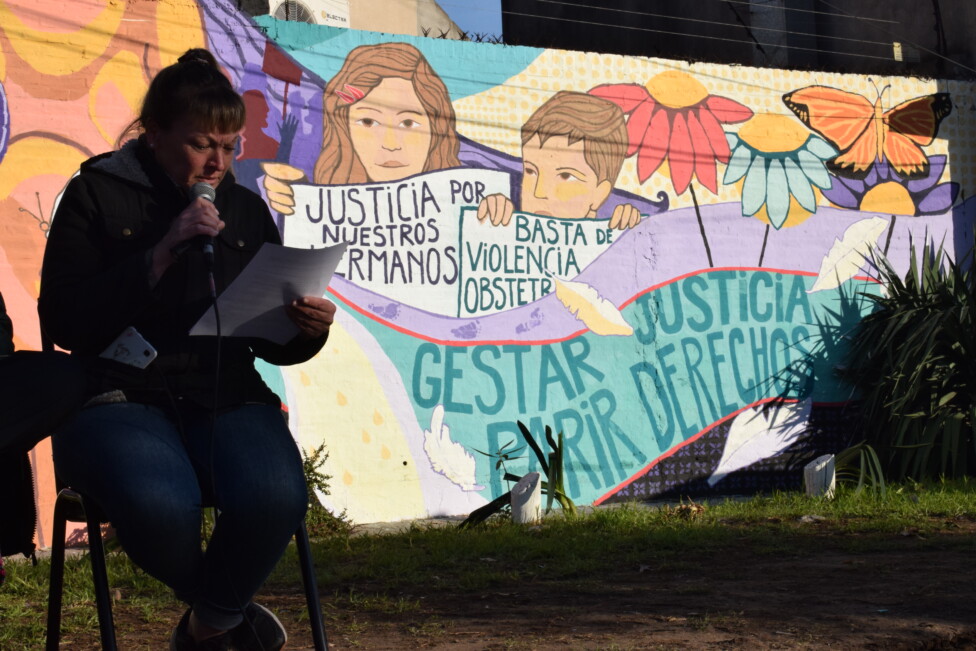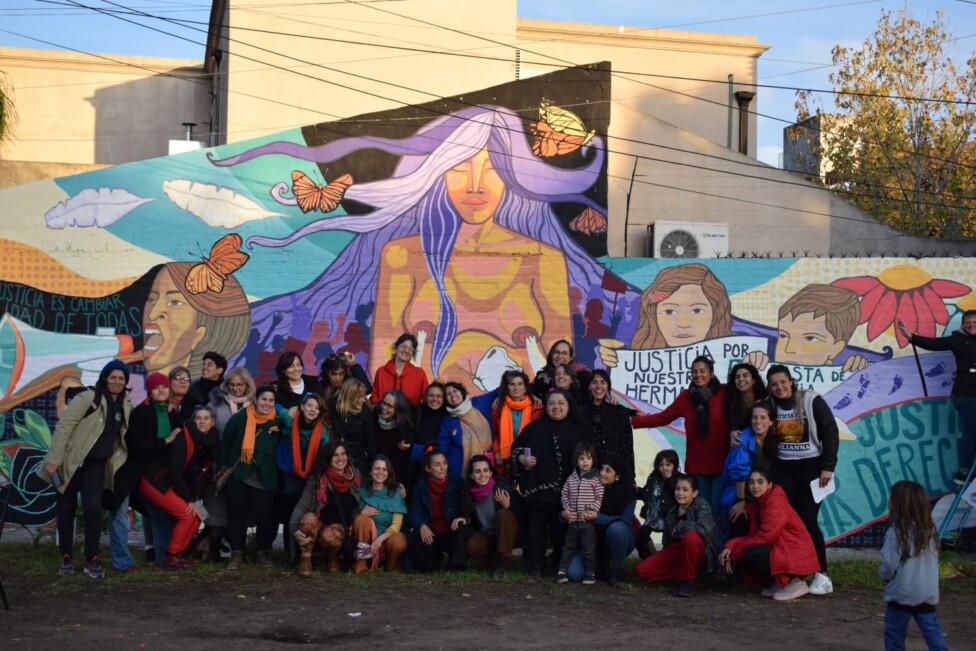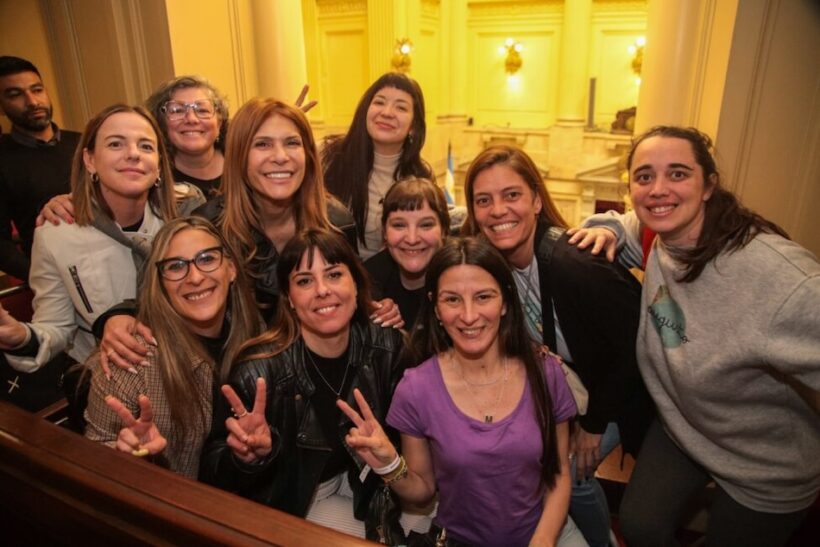In 2014, Johanna Piferrer was 33 weeks pregnant when she suffered the sudden death of her unborn child, revealed by an emergency ultrasound scan. Devastated, she had to wait nine hours in the maternity ward of a hospital in the Argentine capital, where she could hear the cries of newborns, amidst grandparents arriving with gifts for their grandchildren.
By Daniel Gutman
Then they told her that she should give birth to her stillborn child by natural childbirth, but she firmly refused: she said she was not psychologically prepared and managed to have a caesarean section. Finally, she was given the body of her baby, whom she was to name Ciro, in a box originally intended to hold papers. She received no counselling at any time.
With her grief behind her, she went public with her story and was surprised to receive messages from dozens of women who had also experienced obstetric violence. Thus, she led a group of women who, after years of activism, succeeded in getting the Argentinean National Congress to approve the first law that guarantees care for women who have to give birth to lifeless babies.
Law 27.733, known as “Ley Johanna”, was approved on 29 September and promulgated on 12 October. It instructs health personnel to ensure respectful childbirth, in a supportive and caring environment, for women who suffer a perinatal death.
According to the World Health Organisation (WHO), a perinatal death is a death that occurs between the 22nd week of gestation and the first seven days of the baby’s life.
“All women suffer obstetric violence. I lost many pregnancies and, in that process, I went through many situations that were very violent for me, but I never had the force to denounce it. You have to understand that for every woman who decides to denounce obstetric violence, there are hundreds who don’t dare to do so”: María Laura Anzorena.
“At first I thought I was the only one who had gone through such a situation. But after that I didn’t feel so lonely, when I realised that my case spoke of the reality of the health system, where the violation of rights and violence was the norm in both public hospitals and private sanatoriums,” Johanna Piferrer, who lives in the southern Buenos Aires suburb of Lanús and is studying social work, tells IPS.
“There was no protocol for these cases. I learned that perinatal death was taboo not only in the public health and political agenda, but even in the feminist agenda,” adds the activist, who is now 41 years old.
When she gathered her strength, Piferrer decided to take up the fight and denounced what she considered “torture” in multiple administrative, legislative and judicial bodies.
Thus, in 2016, she achieved an unprecedented resolution from the National Ombudsman’s Office, which urged the British Hospital in Buenos Aires – where she had been treated – to train its staff in the proper accompaniment of gestational and perinatal loss and to provide an isolated room and specific protocols for these cases.
With other women, she built up networks over the course of nine years and succeeded in getting many health hospitals and universities to invite her to interdisciplinary roundtables on obstetric violence.
“We even managed to get the Narciso López Hospital in Lanús to draw up a protocol on gestational and perinatal death care, based on the bill, long before it was passed by Congress,” says Piferrer.
 Celeste Cornejo, in May this year, during the inauguration of a mural that seeks to raise awareness about the right of Argentinean women to have access to a humanised birth, in Morón, in the outskirts of Buenos Aires. Image: Gestar justicia, parir derechos
Celeste Cornejo, in May this year, during the inauguration of a mural that seeks to raise awareness about the right of Argentinean women to have access to a humanised birth, in Morón, in the outskirts of Buenos Aires. Image: Gestar justicia, parir derechos
Gesturing justice, giving birth to rights
In July 2018, four years after Johanna’s case, Celeste Cornejo, 33 weeks pregnant, began to feel severe pain and contractions. For a week straight she went every day to the emergency room of Morón Hospital, in the west of Greater Buenos Aires, where she was subjected to interminable waits and told to go home every time.
One night when she began to have blood loss and the pain intensified, they finally agreed to admit her to a labour ward.
“They put an IV in my arm and that was it. All night I was tired of calling doctors and nurses, but no one listened to me. Finally, at 6:30 in the morning I was monitored and then they took me to an operating theatre and did an emergency caesarean section. I didn’t hear the baby cry and no one would tell me anything, until half an hour after they told me that my son was stillborn,” Cornejo told IPS.
“The baby was shown in a cardboard box to my niece, who was forced to sign that she recognised him. To this day I still don’t know if he was stillborn, if he was switched or what happened,” she adds.
Through social networks, Cornejo learned of other cases of women who were mistreated during births at Morón Hospital, with very serious consequences. Some, like her, lost their children.
Determined, seven women joined forces to denounce the situation together, with the idea that others would not suffer the same violence. Together with an interdisciplinary group of professional women, they created an organisation called Gestar Justicia, Parir Derechos (Gesturing Justice, Giving Birth to Rights) a year and a half ago.
Through it, they do activism and give legal advice to women who are victims of obstetric violence.
“The idea is to denaturalise obstetric violence during pregnancy, childbirth and the postpartum period. Also, of course, to promote the training of doctors and nurses to deal with perinatal deaths, because today they do not know how to handle the situation and how to accompany the family in mourning,” explains Cornejo, 40.
The organisation also supported the passing of the Johanna law, which, among other rights, guarantees that in the case of perinatal death, women will be able to make contact with the lifeless body and will have the option to do so with psychological assistance. It also establishes the right to be informed of the cause of death and to request an autopsy.
 A group of women pose next to the mural “Gestar justicia, parir derechos: el arte como justicia restaurativa”, in the Argentinean municipality of Morón, one of the most populated in Greater Buenos Aires. Image: Gestar justicia, parir derechos.
A group of women pose next to the mural “Gestar justicia, parir derechos: el arte como justicia restaurativa”, in the Argentinean municipality of Morón, one of the most populated in Greater Buenos Aires. Image: Gestar justicia, parir derechos.
A norm that adds rights
The new law complements a scheme that already included the law on humanised childbirth, in force since 2004, which guarantees the right of women to receive information on medical interventions during pregnancy, childbirth and postpartum and to be accompanied by a person they trust during the birthing process.
Also on the scene is the 2009 law for the comprehensive protection of women, which recognised obstetric violence as a specific form of gender-based violence.
The law defined it as “that which is exercised by health personnel over women’s bodies and reproductive processes, expressed in a dehumanising treatment, an abuse of medicalisation and pathologisation of natural processes”.
You may also be interested in:
Medical abortion expands women’s rights in Argentina
One year after, the right to abortion is still under construction in Argentina.
María Laura Anzorena, a lawyer and sociologist who is a member of Gestar Justicia, Parir Derechos, tells IPS that, in this context, La Ley Johanna makes it clear that the pain of losing a wanted child is often compounded by suffering related to institutional and gender-based violence.
Anzorena became involved in the case when she heard about the repeated cases of obstetric violence in the Morón Hospital, but she says that she already had her own personal traumatic experiences.
“All women suffer obstetric violence. I lost many pregnancies and, in that process, I went through many situations that were very violent, but I never had the force to denounce it. You have to understand that for every woman who decides to denounce obstetric violence, there are hundreds who don’t dare to do so,” she says.
Anzorena says that this happens especially when the baby is healthy. “When a woman goes home with her child, there is a mandate to be happy. But the reality is that many return home with a baby, but broken because of the abuse,” she says.
The National Coordinating Commission of Actions for the Elaboration of Gender Violence Condemnations (Consavig), which operates within the ambit of the Ministry of Justice, also played an important role in the new law.
Its coordinator, Perla Prigoshin, tells IPS that from now on the success of the law will depend on the authorities throughout the country, as each province will have to decide if it will adhere to it. In any case, she is particularly appreciative of what has already been achieved: giving visibility to an issue that has not been talked about.
“It is elementary that a woman who loses a child must be psychologically supported and can never be put in the same room with breastfeeding mothers. That is why the value of this law is that for the first time the discussion brought society’s attention to the suffering of a woman who has lost a being she has built up as a child,” says the specialist.






